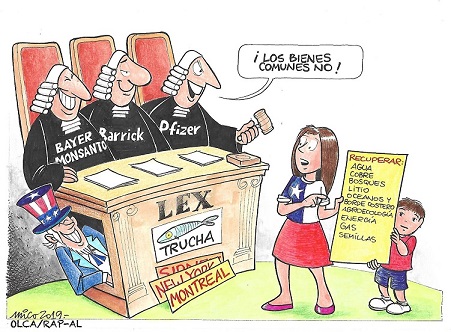Walmart uses FTA to sue Chilean government for insufficient repression of popular protests
All the versions of this article: [English] [Español]

GRAIN | 27 November 2019
Walmart uses FTA to sue Chilean government for insufficient repression of popular protests
by Camila Montecinos
In the midst of a brutal police and military crackdown on massive popular protests in Chile, Walmart, the world’s largest multinational retail corporation, is taking the Chilean government to court to demand that the “forces of law and order” protect its stores and “restore order and the rule of law”. Walmart’s demand is based on the privileges afforded to foreign companies in the free trade deal Chile signed with the US, writes Chilean activist Camila Montecinos.
On Wednesday, 16 October 2019, high-school students in Santiago, Chile launched a call for a massive evasion of subway fares, which are the highest in Latin America, after the government had increased ticket prices a couple days earlier. The police reacted with force to their peaceful action, but the protests only grew in size. On Friday, October 18th, there were massive protests not only in Santiago but in all major Chilean cities. That night, the Government declared a state of emergency, which meant that for the first time since the end of the Pinochet Dictatorship in 1990, the military were on the streets to repress social protests. During the following days, social protest spread to the entire country: from big cities to very small towns, people demonstrated. In a single day, over 3 million Chileans (out of a total population of around 17 million) were in the streets. One common demand had sprung up everywhere: NO MORE ABUSES.
Chile was the first country to adopt neoliberalism as national policy, even before the governments of Thatcher in the UK or Reagan in the US. In 1980, the Pinochet Dictatorship enshrined neoliberalism within a Constitutional mandate; since then, property rights have been untouchable under the Chilean Constitution and are situated at the top of a hierarchy of rights, over any social rights such as education, health care, housing, or labor rights. Under the Constitution, the State cannot protect rights if such actions in any way limit property rights.
Almost 40 years later, Chile has become one of the most unequal countries in the world. Hence, it was only natural that a second demand arose rapidly everywhere among the protestors: A NEW CONSTITUTION. This second demand sent alarm bells ringing for those controlling economic or political power. While the protestors’ objections to being abused could be watered down with some temporary hand-outs offered by the government, a new Constitution would mean the end of decades of privileges for a tiny minority.
Repression immediately got much worse. To date, almost 300 persons, most of them youth, have lost one or both eyes from being shot with pellets by the police. Almost 25,000 people have been arrested, 24 killed, and over 2000 wounded. Of those arrested, over 10% are children. There are over 300 cases of documented human rights violations, including rape, sexual harassment, torture and illegal arrests. But protests have not stopped.
It is in this context that Walmart is suing the Chilean State for not providing enough police protection and is demanding (by invoking the right to property protected by the Constitution) permanent police protection as well as “dissuasive” action by the “forces of law and order” in order to “restore order and the rule of law”. The legal basis for this is that Walmart is guaranteed “national treatment” by the Chile-US FTA; that is, thanks to a Free Trade Agreement, Walmart enjoys full Constitutional protection in Chile. Just as a comparison, immigrants do not have such rights in the US, in Europe or in other countries.
Walmart has set up 384 stores throughout Chile, and controls over 40% of the sales by supermarkets. Since it was incorporated in Chile, Walmart has become widely known for illegal market control strategies, labor abuses, anti-union policies, low wages, illegal charges, and anti-competitive policies. Although demonstrations have been mostly peaceful, there have been attacks against banks, supermarkets, pharmacies, private health insurance companies, big retailers, public transportation and retirement funds administration companies. They all represent highly concentrated sectors and transnational conglomerates which have been central in keeping wages low, as well as fares and indebtedness high, while providing low quality services and using all sorts of abusive practices. In the case of Walmart, 105 stores have been attacked, some of them burnt down. Although the vast majority of protesters do not support these actions, it is also understood that they have been provoked by rage and a generalised sense of being permanently abused.
So, the question now is what does Walmart want? More repression? More blinded people? More deaths? More people in prison? A wider use of torture? Justice in Chile has a well-known bias in favour of economic power and big capital, and it would be no surprise if the courts ruled that permanent police protection be granted to Walmart. But Walmart can easily say that whatever is granted is not enough, as social protest will continue, and hence move its legal action to international investor-state dispute settlement panels, where it can request further police protection as well as significant economic compensation. Walmart can invoke Article 10.4 of the US-Chile FTA which grants “full protection and security” by police forces.
Social organisations that have been active against FTAs, since the infamous Free Trade Area of the Americas (FTAA) was being negotiated and later defeated, have warned about FTAs being used to worsen repression and police abuse. Throughout, governments, parliaments, political parties, business associations and the like have labeled such concerns as “paranoia”. It just took one strong and massive protest movement to show that FTAs can and will be used as a tool to repress and maintain abuse.
We, the people of Chile, will keep mobilising until abuse is ended, whether it comes from Walmart, the government, the police, transnational corporations, or from the national elite.





